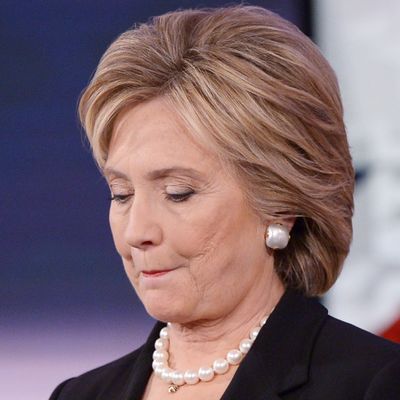
Let’s get one thing out of the way: The Democratic debate held in Iowa Saturday tonight, seen by the approximately 37 people who elected to spend their Saturday night listening to candidates argue about the potential upsides of reinstating Glass-Steagall, was light-years away from any debate that has so far been held by Republicans.
The level of discourse was dramatically higher, the disagreements more nuanced and humane than what’s been going on in Republican spheres, where last I checked Donald Trump was hinting at the castration of his rival.
Democrats who watched tonight should have been pleased to hear three intelligent, qualified candidates for president say the names of victims of police violence and respectfully acknowledge student activism; agree that we need more affordable health care, drastically reduced college costs, and a higher minimum wage; push back against religious intolerance in their responses to terrorism; and affirm that we need comprehensive immigration reform. Saturday’s discussion was mostly substantive; with one big exception (which I’ll get to), moderator John Dickerson did a terrific job of asking smart questions and pressing candidates on difficult subjects. Democrats have a strong, smart field they can feel good about.
That’s great. But these candidates’ bona fides and infinite superiority to any of the Republicans in contention were established during the first debate. What was notable tonight was that it laid everything bare — not just the good, but the bad of what the Democratic party and its contenders for the presidency have to offer.
The first rough patch was straight out of the gate and was very bad for Bernie Sanders, coming as it did in the shadow of Friday night’s horrific terrorist attacks on Paris. Just before the debate had come reports that the Sanders campaign, aware of its candidate’s weakness on foreign policy, had balked at a proposed change in format that would emphasize a discussion of the terrorist attacks and ISIS.
The campaign denied those reports, but Sanders’s response to Dickerson’s first question, in which he asked candidates to reflect on the events in Paris, only worked to bolster the impression that Sanders was desperate to dodge the foreign-policy debate. Given a minute to respond, Sanders made it through only about 15 seconds about Paris before bolting back to his stump speech on domestic economic inequality. It was a shaky start, and certainly not one that allayed fears about Sanders’s Oval Office capabilities. In addition to sounding out of his league on anything outside of U.S. borders, Sanders’s apparent unwillingness or inability to swiftly adjust course in response to unexpected events does not instill presidential confidence.
But it’s not as though Sanders’s rival, Clinton, was done many favors by the foreign-policy debate. Clinton, as a former member of the Armed Services Committee and secretary of State, has loads of foreign-policy experience and can rattle off names, dates, history, and context. But when it comes to instability in the Middle East, acknowledgment of Clinton’s record leads quickly to some of progressives’ most resonant anxieties about her potentially hawkish presidency. On Saturday, Sanders hit Clinton hard on her vote for the war in Iraq that was such a significant factor in the rise of ISIS. Dickerson, serving as a no-nonsense interlocutor, also helped Clinton’s rivals press her on her interventionist approach to Libya while she was secretary of State in the Obama administration.
The contrast between the two candidates wasn’t flattering to either: one candidate appeared out of his depth, the other in way too deep.
Both Clinton and Sanders got hit hard on other weak spots. Clinton, pivoting off a keen question from Dickerson about why Sanders’s gun votes should stick to him if her Iraq vote didn’t stick to her, again pressed Sanders to own up to his bad votes on gun control. He again appeared flustered. Meanwhile, Sanders and Dickerson (and O’Malley, who was also there) effectively lit into Clinton on her ties to Wall Street. Clinton’s response here was pretty cringey: She evoked the terror attacks of 9/11, a move she may have intended as a kind of rejoinder to Sanders’s line on gun control — My job in the Senate was to represent the interests of my state. Instead, it came off as a non sequitur (the terrorist attack was near Wall Street? What did this have to do with speaking fees she’s received in recent years?) and recalled Rudy Giuliani — probably not the look she was going for.
But it wasn’t just the candidates who had their warts exposed. It was also the party itself.
It is, frankly, bullshit that this debate — the second of only four official matchups scheduled to happen before the Iowa caucuses and New Hampshire primary — was on a Saturday night and is likely to have enjoyed an audience in the high dozens.
These are politicians who are speaking nimbly about minimum-wage hikes, systemic racism, and financial reforms (finally, after years of these topics going unaddressed). Yet, they’re being hidden under every kind of bushel: They’re confined to six debates, the next of which will be held on another Saturday night right in the middle of the holiday season, ensuring that viewership might even be lower than it was tonight.
What is also bullshit — and I cannot say this forcefully enough — is that in a two-hour debate, there was again not a single question about reproductive health care in America.
All by itself, in a country in which access to both abortion services and affordable birth control are increasingly imperiled, this is inexcusable. It is especially incomprehensible given that yesterday the Supreme Court of the United States announced that it would hear a case that could overturn Roe v. Wade. The court’s ruling will come next summer, in the months leading to the general election.
That this subject has not come up over the course of two lengthy debates makes no sense. In an election in which candidates are anxious to address, and the electorate is anxious to hear about, issues of economic inequality, these candidates should really be talking about repealing the Hyde Amendment, which bars the use of federal funds for abortions, yet so far we haven’t even gotten five minutes on the House’s repeated attempts to defund Planned Parenthood.
This was a debate in which the otherwise-excellent Dickerson acknowledged the stupidity of talking about Clinton’s emails in the same breath that he asked yet another question about Clinton’s emails, yet did not manage to ask her a question about abortion, about the Supreme Court, about Planned Parenthood, or about contraception. For that matter, there were only passing references to paid family leave, and no discussion of subsidized child care.
It was again up to Clinton herself, as it was in the first debate, to bring up support for Planned Parenthood, but she received no traction from her adversaries or the moderators. It was almost as though women’s rights to control their reproduction and family size were not fundamental to their economic, social, professional, and political equality.
Democrats’ failure to make issues of comprehensive reproductive justice central to their primary is also strategically stupid, since now is the time when the Republicans are trying to outdo each other with insane litmus tests over which one of them would more effectively force rape and incest survivors to carry their unwanted pregnancies to term. They will inevitably soften as they get closer to a general election, and Democrats, who have failed to own this issue now, will have little to hit them with.
Two such strong candidates, and the journalists who get the chance to grill them on their ideas about America’s future, are capable of doing better. I trust that soon they will. Hopefully, they can get some more people to tune in when they do.





